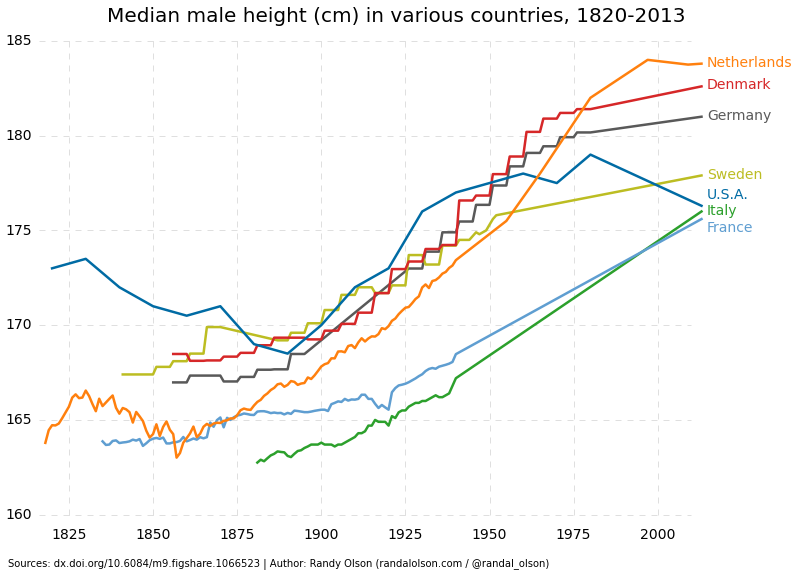Welcome to Debate Club! Please be aware that this is a space for respectful debate, and that your ideas will be challenged here. Please remember to critique the argument, not the author.
World’s obese population hits 641 million, global study finds

GaleHawkins
Posts: 8,159 Member
channelnewsasia.com/news/world/world-s-obese-population/2655302.html
This article covers different parts of the world and where people are the most thick and thin body wise.
This article covers different parts of the world and where people are the most thick and thin body wise.
0
Replies
-
bloomberg.com/news/articles/2016-03-31/the-world-may-have-too-much-food
A different spin on the same study.1 -
Interesting. Thanks for sharing.0
-
That's some scary s**t. Thank you for sharing the articles. I guess there is a downside to living in a prosperous country; who would have guessed?0
-
Beats not having enough food (and I recognize that food insecurity is still an issue). I'd much rather have to worry about working to avoid gaining weight than have to worry about starving or actually starve, if crops failed or grasshoppers came and ate everything or who knows what.1
-
There was a report on the news last night saying Obesity is now more of a problem than starvation/malnutrition!0
-
We're also getting much taller as a world.
Scientific American: Why are we getting taller as a species?
The Conversation: Why did humans grow four inches in 100 years?
Our World in Data: Human Height
This is a great graph from Dr. Randal Olson on height averages in several nations. The trend holds worldwide.
This is also related to nutrition.
0 -
Don't look at me, I reduced the number by one, it must be everyone else not doing their part.
Heck, I'm going to reduce the number of overweight by one in a week or two.1 -
I read an article on Yahoo! that 1 in 8 people are considered obese, and within the next 10-15 years that number with go to 1 in 5, that is sad, and I feel like a lot of us are trying our best to not be a statistic. Let's keep it up people!1
-
Habitual behavior is the main culprit. Yes, there's more food available in just about every industrial country, but HOW much people eat is the direct reason. If your parents pile your plate, you'll grow up habitually eating that way. And vice versa.
I also believe that moving from a situation where you didn't have much growing up, then being exposed to plenty of options with limitless supplies makes a difference. Many people who migrate to the US end up gaining a significant amount of weight within 10 years.
A.C.E. Certified Personal and Group Fitness Trainer
IDEA Fitness member
Kickboxing Certified Instructor
Been in fitness for 30 years and have studied kinesiology and nutrition 1
1 -
Habitual behavior is the main culprit. Yes, there's more food available in just about every industrial country, but HOW much people eat is the direct reason. If your parents pile your plate, you'll grow up habitually eating that way. And vice versa.
I was just pointing out to my mother how silly her plates/cups/bowls look with normal serving sizes in them. She has these absolutely giant serving things and ordinary portion sizes are swallowed up in them. I'm not terribly surprised that I put on 50 lbs when I moved home to care for her, in retrospect.
I eat/drink out of children-sized dishes. That 1/2 cup of ice cream may look sad in a 1 cup capacity bowl, but it looks far less sad than in my mom's monster bowls.1 -
Big coverage on BBC yesterday - figures are alarming just like the "what's next".
Previous 20 years + projections over the next 15/20 years see a steady yet dramatic increase in the levels published and food industry remains partially / barely regularised.
Trends lead to over buying and over eating - food has become a centre piece of everyday life but with very little education, controls and a considerable amount of ignorance on the choices people make (both voluntary and "kept in the dark" ignorance).
0 -
Recently found this article saying that now, over half of calories consumed in the US are from ultra processed foods, according to self reports.

http://www.techtimes.com/articles/139909/20160310/more-than-half-of-american-calories-come-from-processed-food.htm0 -
Christine_72 wrote: »There was a report on the news last night saying Obesity is now more of a problem than starvation/malnutrition!
Maybe in "developed" countries. I kind of doubt that's a global phenomenon.0 -
20% by 2025?
That sounds like it is good for business.
0 -
DancingDarl wrote: »Christine_72 wrote: »There was a report on the news last night saying Obesity is now more of a problem than starvation/malnutrition!
The obese can be malnutritioned also and starved of nutrients which then feeds this endless binge fest.
I can see both of these things happening at the same time. When I started eating in a way that gave my body what it was really needing the health started to return and the weight moved back closer to my normal weight range. And yes @EvgeniZyntx this is huge for business. MFP and other are well positioned I expect. I just hope real solutions win out. I had to get well before I could lose weight. The body can fix a lot of stuff but has to have its expected nutrients for sure.0 -
Seems a waste of effort documenting this, resources would be better used in an intervention.0
-
lisawinning4losing wrote: »Recently found this article saying that now, over half of calories consumed in the US are from ultra processed foods, according to self reports.

http://www.techtimes.com/articles/139909/20160310/more-than-half-of-american-calories-come-from-processed-food.htm
Ultra processed foods don't make people fat. Eating too much food and not moving enough makes people fat.1 -
Interesting that they describe morbid obesity as impacting breathing or walking, but that's only one of the definitions of morbid obesity.0
-
lisawinning4losing wrote: »Recently found this article saying that now, over half of calories consumed in the US are from ultra processed foods, according to self reports.

http://www.techtimes.com/articles/139909/20160310/more-than-half-of-american-calories-come-from-processed-food.htmlisawinning4losing wrote: »Recently found this article saying that now, over half of calories consumed in the US are from ultra processed foods, according to self reports.
http://www.techtimes.com/articles/139909/20160310/more-than-half-of-american-calories-come-from-processed-food.htm
The article says participants ate on average 2,070 cals/ day, and reported 28% consumption from minimally processed to unprocessed foods, 3.1% from olive oil and table sugar, and 10% from processed foods. That adds up to a total of 41% of their consumption. Are we just inferring that the remainder of the calories come from ultra processed foods? Strange that they wouldn't actually come out and provide that number in the paragraph where they are detailing the findings.0 -
-
Packerjohn wrote: »lisawinning4losing wrote: »Recently found this article saying that now, over half of calories consumed in the US are from ultra processed foods, according to self reports.

http://www.techtimes.com/articles/139909/20160310/more-than-half-of-american-calories-come-from-processed-food.htm
Ultra processed foods don't make people fat. Eating too much food and not moving enough makes people fat.
@Packerjohn it would be great if that was factual medically speaking.0 -
That is a good point. Two years ago when was obese with a 35 BMI it did not have a clue my BMI #.0 -
I don't have a particular stance on it. I was morbidly obese by 2 different weight based definitions but never had comorbidities. I account myself lucky in that regard, though I always thought if I started down prediabetes, fear of having to inject myself would get me changing things. I guess I found different motivation.0 -
GaleHawkins wrote: »Packerjohn wrote: »lisawinning4losing wrote: »Recently found this article saying that now, over half of calories consumed in the US are from ultra processed foods, according to self reports.

http://www.techtimes.com/articles/139909/20160310/more-than-half-of-american-calories-come-from-processed-food.htm
Ultra processed foods don't make people fat. Eating too much food and not moving enough makes people fat.
@Packerjohn it would be great if that was factual medically speaking.
Please share your medical facts about how surplus calories vanish into thin air if they're not from processed foods.1 -
stevencloser wrote: »GaleHawkins wrote: »Packerjohn wrote: »lisawinning4losing wrote: »Recently found this article saying that now, over half of calories consumed in the US are from ultra processed foods, according to self reports.

http://www.techtimes.com/articles/139909/20160310/more-than-half-of-american-calories-come-from-processed-food.htm
Ultra processed foods don't make people fat. Eating too much food and not moving enough makes people fat.
@Packerjohn it would be great if that was factual medically speaking.
Please share your medical facts about how surplus calories vanish into thin air if they're not from processed foods.
Thanks was just going to follow up on @GaleHawkins comment.0 -
For 90%+ of.the population the results of a simple BMI measurement would match the classification of any functional definition someone would develop0 -
Disgusting.0
-
stevencloser wrote: »GaleHawkins wrote: »Packerjohn wrote: »lisawinning4losing wrote: »Recently found this article saying that now, over half of calories consumed in the US are from ultra processed foods, according to self reports.

http://www.techtimes.com/articles/139909/20160310/more-than-half-of-american-calories-come-from-processed-food.htm
Ultra processed foods don't make people fat. Eating too much food and not moving enough makes people fat.
@Packerjohn it would be great if that was factual medically speaking.
Please share your medical facts about how surplus calories vanish into thin air if they're not from processed foods.
Aslin P. Unveiling the unicorn: a leader's guide to ACO preparation. J Healthc Manag. 2011 Jul-Aug;56(4):245-53.
Bailey T. The dummies guide to promoting wildlife conservation in the Middle East: telling tales of unicorns and ossifrages to save the hawk and leopard. J Avian Med Surg. 2011 Jun;25(2):136-43.
Pentecost MJ. Unicorn ahead. J Am Coll Radiol. 2011 Feb;8(2):86.
Isaacs D. The unicorn. J Paediatr Child Health. 2009 Oct;45(10):618, 623
Hortin GL. Of immunounreactive urinary albumin and unicorns. Am J Clin Pathol. 2008 Aug;130(2):314-5.
Graf J. Never play Leapfrog with a unicorn. Crit Care Med. 2007 Oct;35(10):2434-5.
O'Sullivan M. Unicorns or Tiger Woods: are lie detection experts myths or rarities? A response to on lie detection "wizards" by Bond and Uysal. Law Hum Behav. 2007 Feb;31(1):117-23.
Frenking G, Krapp A. Unicorns in the world of chemical bonding models. J Comput Chem. 2007 Jan 15;28(1):15-24. Review.
Sage WM, Kalyan DN. Horses or unicorns: can paying for performance make quality competition routine? J Health Polit Policy Law. 2006 Jun;31(3):531-56.
Potter P. Unicorn tapestries, horned animals, and Prion disease. Emerg Infect Dis. 2004 Jun;10(6):1181-2
Askanas V, Engel WK. Unicorns, dragons, polymyositis, and other mythical beasts. Neurology. 2004 Jul 27;63(2):403-4; author reply 404.
Hagan JC 3rd. Unicorns, obstetricians, neurosurgeons--three things hard to find in Missouri. Mo Med. 2004 Jan-Feb;101(1):4-5.
Streiner DL. Unicorns do exist: a tutorial on "proving" the null hypothesis. Can J Psychiatry. 2003 Dec;48(11):756-61.
Amato AA, Griggs RC. Unicorns, dragons, polymyositis, and other mythological beasts. Neurology. 2003 Aug 12;61(3):288-9.
LeBoit PE. Pictures of a unicorn? Am J Dermatopathol. 2003 Feb;25(1):88-91
Simon L. Research into the origins and characteristics of unicorns: mental illness as the unicorn. Ethical Hum Sci Serv. 2000 Fall-Winter;2(3):181-92.
Howe EG. Unicorns, Carravaggio, and fetal surgery. J Clin Ethics. 2001 Winter;12(4):333-45.
Ariew R. Leibniz on the unicorn and various other curiosities. Early Sci Med. 1998 Nov;3(4):267-88.
Stahl FW. Unicorns revisited. Genetics. 1992 Dec;132(4):865-7.
Foster PL. Directed mutation: between unicorns and goats. J Bacteriol. 1992 Mar;174(6):1711-6.
Morreim EH. The law of nature and the law of the land: of horses, zebras, and unicorns. Pharos Alpha Omega Alpha Honor Med Soc. 1990 Spring;53(2):2-6.
[No authors listed] Editorial: Why unicorns? Med J Aust. 1976 May 15;1(20):728-9.
http://alanaragon.com/unicorns0 -
Packerjohn wrote: »
For 90%+ of.the population the results of a simple BMI measurement would match the classification of any functional definition someone would develop
Not really, I imagine the functional definition.captures more people. Functional means they have a BMI of 30+ and at least one obesity related issue. The non functional definitions are BMI of 40+ (I'd have to double check to be sure) or 100 lb past overweight (overweight being BMI 25+).0 -
GaleHawkins wrote: »Packerjohn wrote: »lisawinning4losing wrote: »Recently found this article saying that now, over half of calories consumed in the US are from ultra processed foods, according to self reports.

http://www.techtimes.com/articles/139909/20160310/more-than-half-of-american-calories-come-from-processed-food.htm
Ultra processed foods don't make people fat. Eating too much food and not moving enough makes people fat.
@Packerjohn it would be great if that was factual medically speaking.
LOL, I wish I could say more, but I won't.0
This discussion has been closed.
Categories
- All Categories
- 1.4M Health, Wellness and Goals
- 398.2K Introduce Yourself
- 44.7K Getting Started
- 261K Health and Weight Loss
- 176.4K Food and Nutrition
- 47.7K Recipes
- 233K Fitness and Exercise
- 462 Sleep, Mindfulness and Overall Wellness
- 6.5K Goal: Maintaining Weight
- 8.7K Goal: Gaining Weight and Body Building
- 153.5K Motivation and Support
- 8.4K Challenges
- 1.4K Debate Club
- 96.5K Chit-Chat
- 2.6K Fun and Games
- 4.8K MyFitnessPal Information
- 12 News and Announcements
- 21 MyFitnessPal Academy
- 1.5K Feature Suggestions and Ideas
- 3.2K MyFitnessPal Tech Support Questions














